2001 Toyota Tundra Service, Tires & Repairs
Get Started
Complete Auto Care for Your 2001 Toyota Tundra
-
TIRES FOR YOUR 2001 Toyota Tundra View Tire Info GET TIRE PRICING
-
REPAIR FOR YOUR 2001 Toyota Tundra View Repair Info SCHEDULE REPAIR
-
MAINTENANCE FOR YOUR 2001 Toyota Tundra View Maintenance Info SCHEDULE MAINTENANCE
-
OFFERS FOR YOUR 2001 Toyota Tundra Limited Time Tire Offers VIEW ALL COUPONS
2001 Toyota Tundra Tires
Recommended Tires | Tire Information
2001 Toyota Tundra Tires Sizes, Speed Ratings, and Inflation
Not sure about your 2001 Toyota Tundra tire size? Use the following chart to find information on tire size, speed rating, and inflation.
| Trim Level | Speed Rating | Inflation in PSI F/R | Tire Size |
|---|---|---|---|
| 2001 Toyota Tundra SR5* | S | 26 PSI/29 PSI | P265/70R16 |
| 2001 Toyota Tundra SR5* | S | 26 PSI/35 PSI | P245/70R16 |
| 2001 Toyota Tundra Limited | S | 26 PSI/29 PSI | P265/70R16 |
| 2001 Toyota Tundra Base | S | 26 PSI/35 PSI | P245/70R16 |
|
2001 Toyota Tundra SR5* Speed Rating: S Inflation F/R: 26 PSI/29 PSI |
|
2001 Toyota Tundra SR5* Speed Rating: S Inflation F/R: 26 PSI/35 PSI |
|
2001 Toyota Tundra Limited Speed Rating: S Inflation F/R: 26 PSI/29 PSI |
|
2001 Toyota Tundra Base Speed Rating: S Inflation F/R: 26 PSI/35 PSI |
* Note: these models have different tire sizes depending on vehicle options.
Recommended Tires for Your 2001 Toyota Tundra
What tires are best for a 2001 Toyota Tundra? Check out the following tire brands and types.
 ALENZA AS ULTRA
ALENZA AS ULTRA
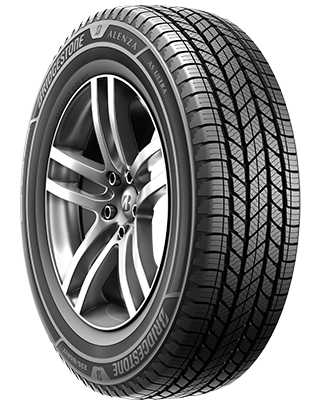
- No warranty
- All-Season
- Light Truck Tires
 Blizzak DM-V2
Blizzak DM-V2
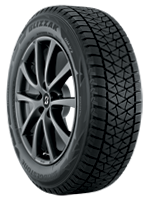
- No warranty
- Winter
- Winter
 Dueler A/T Revo 3
Dueler A/T Revo 3
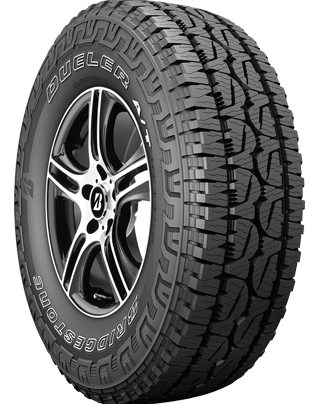
- Platinum Pact Limited Warranty
- All-Season
- Light Truck Tires
 Destination LE3
Destination LE3
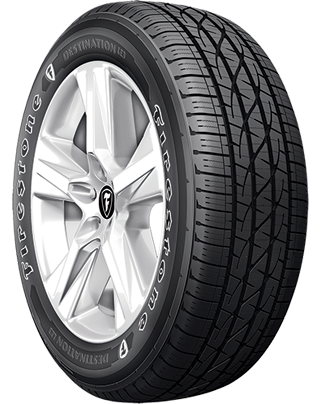
- No warranty
- All-Season
- Light Truck Tires
 Winterforce 2 UV
Winterforce 2 UV
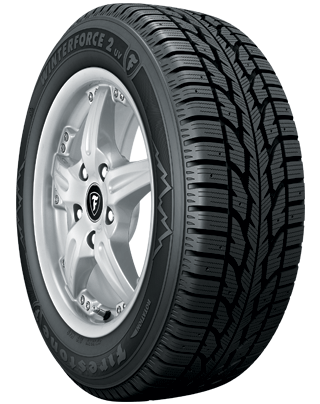
- No warranty
- Winter
- Winter
 Destination A/T2
Destination A/T2
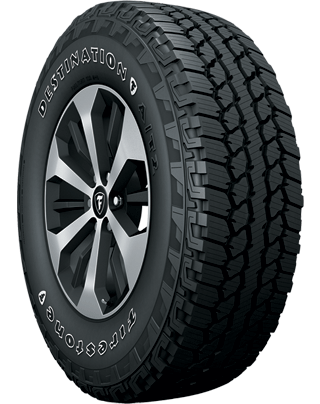
- Gold Pledge Limited Warranty
- All-Season
- Light Truck Tires
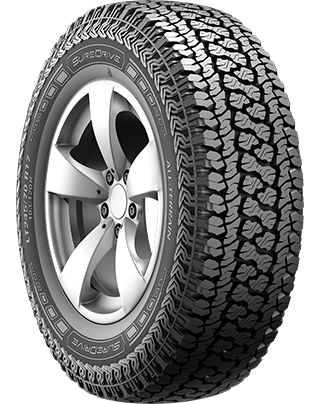
- No warranty
- All-Season
- Light Truck Tires
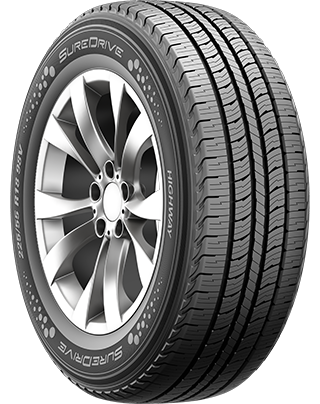
- No warranty
- All-Season
- Light Truck Tires
 OPEN COUNTRY A/T III
OPEN COUNTRY A/T III
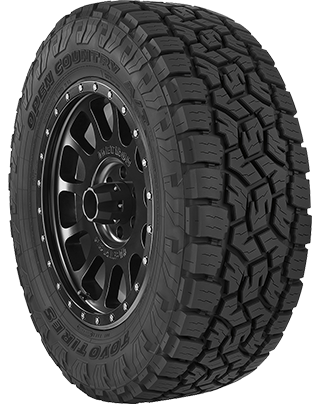
- No warranty
- All-Season
- Light Truck Tires
 OPEN COUNTRY HTII
OPEN COUNTRY HTII
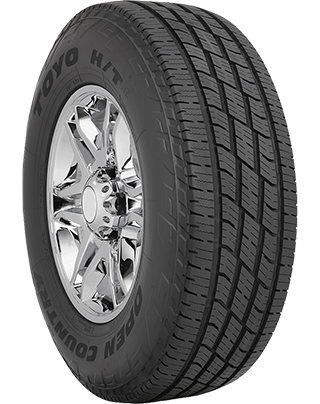
- No warranty
- All-Season
- Light Truck Tires
Choosing 2001 Toyota Tundra Tires
Beyond the correct tire size, you also want to consider a handful of other factors when buying new Toyota Tundra tires like which tire brands you like most and where you drive. When evaluating your driving conditions, think about where you live (countryside vs. city vs. mountains) and the kind of unexpected weather you're likely to experience. Many drivers who live in states that experience all four seasons choose to purchase two sets of tires: one set for winter, one set for summer. Other drivers buy one set of all-season tires instead. That way they don't have to return to the tire shop and their vehicle is always ready for sun, rain, and light snow!
Driving style is next on the list to think about when buying tires. If you're a diehard off-roader, you have very different tire needs than a highway commuter who doesn't leave the paved path. Talk to a tire technician at Firestone Complete Auto Care for help choosing the best tire for you, or start shopping for Toyota Tundra tires online.
2001 Toyota Tundra Tire Installation & Rotation
Firestone Complete Auto Care installs more tires on more cars than most other companies. We're a tire store that also offers professional tire installation, maintenance, and rotation, along with complete auto care. Buy 2001 Toyota Tundra tires online and schedule your installation when it's convenient for you.
2001 Toyota Tundra Tire Q&A
-
Why check Toyota tire inflation? The right tire pressure can make all the difference. Proper tire inflation helps increase fuel economy, improve braking time, and boost tire lifespan! Even a small change in tire pressure can impact your driving.
-
What do the numbers on my Toyota Tundra tires mean? Your tire sidewall gives you information about load carrying capacity, speed rating, treadwear, traction, and tire size. Talk to one of our tire technicians to learn how to read the numbers on your tire!
-
Is there an easy way to check Toyota tire tread depth? Stay on top of your tire tread depth to help avoid a dangerous drive. You can check tread depth with a penny. Hold the penny so that Abraham Lincoln is facing you, then place your penny into a tread groove upside down. If you can see the top of Abe’s head, your tread is shallow and it might be time for new Toyota Tundra tires. Grab a penny. Hold the so that Abe Lincon's head is facing you and his hair is pointing toward the ground. Then, place the penny into a tread groove. If you can see the top of Abe’s head, your tread is shallow and it might be time for new Toyota Tundra tires.
Repair Services for Your 2001 Toyota Tundra
When to repair, when to replace? Click on a repair below to learn more about Toyota Tundra repairs at Firestone Complete Auto Care.
Get Repairs for Your 2001 Toyota Tundra
For most drivers, the words “car repair” don’t exactly spark excitement. But at Firestone Complete Auto Care, we strive to give you the excellent repair experience you deserve. When you come to us for 2001 Toyota Tundra repair services, our skilled repair technicians will get your Tundra back on the road. Before we begin any repair work, we’ll diagnose any issues and answer your questions about potential repair options. We’ll never recommend a repair we don’t think is necessary for your safety or the performance of your Toyota.
What Will Toyota Tundra Repairs Cost?
Several factors can affect the cost to repair your 2001 Toyota Tundra, including the type of repair, prices of appropriate replacement parts, how much labor the repair will take, and where you live. But no matter your location, you may be able to save money with one of our many auto repair coupons or offers.
A few different aspects can influence repair costs for your 2001 Toyota Tundra, like
2001 Toyota Tundra Auto Repair Questions
-
Do I need to follow Toyota's maintenance schedule? One of the best ways to prevent 2001 Toyota Tundra repairs is by staying on top of your Toyota maintenance schedule. This schedule is written by the people who made your vehicle and they know best how to keep it running smoothly.
-
What's wrong if something feels 'off' in my Toyota? You’re in your car, day in and day out. So, it’s only expected that you know your car better than anyone else! If you notice mysterious smells, strange engine noises, or other out-of-the-ordinary symptoms while driving, trust your instincts and stop into Firestone Complete Auto Care for a Courtesy Check. Catching a potential issue early could help prevent Toyota Tundra repairs.
-
Why do you recommend certain repairs for my Toyota? Talk to your technician. We'll never recommend a service or repair for your 2001 Toyota Tundra that we don't think is necessary for your safety.
Get Your 2001 Toyota Tundra Brakes Fixed
Your Toyota Tundra engine may be strong and reliable. But if you can’t brake, it might as well be scrap metal. Don't wait if you're experiencing brake squeaks or a loss of braking power. Unresponsive brakes make it tough to give the road your best. What's more, waiting for things to figure themselves out can result in more damage to your brakes and your wallet. Get your 2001 Toyota Tundra brakes fixed at Firestone Complete Auto Care. We offer many affordable brake repairs like pad/shoe replacement, brake rotor/drum refinishing, brake fluid exchange, and wheel cylinder and brake caliper installation.
Questions About Your Toyota Tundra Brakes
-
What can cause my Tundra to shake when I apply the brakes? Your Tundra could shake when you brake due to worn brake pads or rotors, warped rotors, loose or worn suspension components, or faulty brake calipers. You can always schedule a free brake inspection at the first sign of strange brake behavior.
-
How long should my Tundra brake pads last? Brake pads generally last between 30,000 and 40,000 miles. Your driving can affect how long your Tundra brake pads last, though. For example, mainly driving on highways and gradually braking can help increase the lifespan of your brake pads, and carrying hefty loads or riding your brakes can shorten it.
-
Is it bad if my Tundra is leaking brake fluid when off? Your Tundra brake system is a closed hydraulic system, so a brake fluid leak likely means you have an issue in your brake system. Over time, brake components can wear out or get damaged, causing a brake fluid leak.
2001 Toyota Tundra Drivetrain Repairs
Drivetrains for front, rear, and all-wheel-drive and 4WD vehicles are quite different, so you don't want to go to just anyone for drivetrain repair. You want to come see the technicians at Firestone Complete Auto Care. We can fix many 2001 Toyota Tundra drivetrain components Your Tundra might need driveshaft repair if you notice heavy vibrations in your floorboards, clunks when shifting, resistance when turning, or vibration as your vehicle accelerates.
Questions About 2001 Toyota Tundra
-
What are the symptoms of a damaged Toyota drivetrain system? Your Toyota Tundra drivetrain might be damaged if you notice strange noises from the rear of your vehicle, see fluid leaking, or have issues turning.
-
Why is my Tundra malfunction indicator light (MIL) on? If your Tundra has its malfunction warning light (more commonly called the check engine light) illuminated, it could indicate engine troubles, problems with the transmission, electrical issues, malfunctioning sensors, connector problems, or misfire issues.
-
How worried should I be about a drivetrain malfunction in my Tundra? If your Tundra has a drivetrain malfunction, don't wait. Get it checked out by a professional mechanic. Identifying the underlying cause and performing the appropriate repairs right away can help prevent further damage and avoid unsafe driving conditions.
2001 Toyota Tundra Alignment Services
Alignment services involve precise adjustments to your Toyota Tundra’s suspension system, the connection between the vehicle and the wheels. During the service, your tire angles are adjusted according to measurements recommended by Toyota. Why? So that your tires can make contact with the road at the best possible angle. Before we adjust the alignment of your 2001 Toyota Tundra, we’ll start by checking the current alignment angles. After that, we can adjust your wheel alignment angles until they match Toyota’s recommended measurements.
Questions About Toyota Tundra Alignment
-
How can I avoid knocking my Toyota Tundra out of alignment? Hitting a pothole or curb can alter your wheel alignment. So can general wear and tear over time.
-
How often should you get a wheel alignment for your Tundra? Check your Tundra owner's manual for Toyota's recommended interval. It's generally a good idea to check your alignment every 6,000 miles or 6 months, depending on which comes first.
-
Do you need an alignment with new Tundra tires? It’s likely not a requirement to get an alignment when you install new tires on your Tundra, but it's a smart idea to do so anyway. An alignment can help ensure even tire wear, smooth handling, and better fuel efficiency.
2001 Toyota Tundra Engine Repair
If your 2001 Toyota Tundra needs engine repair, our technicians will make sure you understand what’s going on before they start working on your engine. We never do any work without your sign-off. If a repair can wait, we'll let you know. We'll also tell you if it's necessary for your safety. We want to provide you with the information you need to make an informed engine repair decision. By choosing Firestone Complete Auto Care for Tundra engine repairs and you can feel good knowing that we only use Toyota-compliant replacement parts such as the cambelt, oil gasket, ignition coil, or a different component.
Questions About 2001 Toyota Tundra Engines
-
Why does the check engine light come on when I start my Tundra? Generally, your check engine light turning on upon ignition is not a bad thing. It’s just your Tundra firing up its circuits. The light should turn off in a bit, but come see us if it doesn't.
-
Why is my Toyota Tundra making engine noise? Unusual noises can signal a problem with your Toyota Tundra engine. Tapping or knocking could mean you're low on oil. Whistling could mean a belt is misaligned or there's an intake leak. Squealing can indicate a loose fan belt, and grinding might be coming from the brakes, not the engine.
-
What could damage a Toyota engine? Certain driving habits can hurt your engine. These habits include driving on an empty fuel tank, revving your engine while the vehicle is in Park, or slamming the gas pedal while the engine is still cold. Steer clear of these habits to help protect engine performance and efficiency.
Tire Repair for Your 2001 Toyota Tundra
Firestone Complete Auto Care is here for you when your 2001 Toyota Tundra needs flat tire repair or inspection. Our tire technicians can determine whether it's safe to plug and patch the tire, or whether it needs to be replaced. We'll start by evaluating the state of wear, the location of damage, type of damage, and the size of the damage.
If a repair on your 2001 Toyota Tundra tire is feasible and safe, we'll follow three basic steps to repair it: (1) Remove the tire from the wheel for inspection and repair, (2) fill the puncture to keep the moisture out, and (3) re-seal the inside lining of your tire so that air won’t escape.
Frequently Asked Toyota Tundra Tire Repair Questions
-
Can I drive my Toyota on a flat tire? Driving on a flat or underinflated tire can put extra stress on your wheels and alignment. While it’s sometimes necessary to drive a short distance on a flat tire to get to a safe place, don’t take any other trips in your Tundra until you can have the flat tire repaired or replaced.
-
Will a temporary sealant fix my Toyota's flat tire? Temporary sealants will solve your problem… for a little bit. If you’ve seen temporary or emergency tire sealant before (it usually comes in a can), it can be tempting to turn to this as a solution for your flat tire. Keep in mind that these fixes could buy you some time to get to Firestone Complete Auto Care for a proper repair, but they could also cause some harm in the process (for example, damage to your TPMS). Plus, using a product like this could void your tire warranty.
-
What is causing the tires on my Tundra to keep losing air? If your Tundra tires are always losing air, you may have a puncture, damaged wheel, or leaking valve stem.
Maintenance for Your 2001 Toyota Tundra
You want your Toyota Tundra to last as long as possible. If you put in the effort to keep up with proper maintenance, you could hit 200,000 miles (or beyond!) in your Tundra.
About 2001 Toyota Tundra Scheduled Maintenance
It can be overwhelming, but fortunately, there’s a resource that takes the guesswork out of routine Tundra maintenance. It’s as easy as following the recommended maintenance schedule that’s been written specifically for your 2001 Toyota Tundra! This recommended maintenance schedule is written by the auto manufacturer, Toyota themselves. Driving conditions, climate variations, and other variables can affect which scheduled maintenance services you’ll need; however, there’s a good chance that your vehicle’s recommended maintenance services will include tire rotations, vital fluid checks/exchanges, filter changes, brake pad replacement, and oil changes. Keeping up with routine service appointments is a great way to keep your Tundra running for longer, decrease your risk of dangerous malfunctions on the road, and maybe even save you the headache of dealing with common 2001 Toyota Tundra problems in the future.
Overview of Essential Toyota Tundra Maintenance Needs
Come to Firestone Complete Auto Care for manufacturer-recommended routine maintenance on your 2001 Toyota Tundra and an expert technician will begin by performing a Courtesy Check. This Courtesy Check can establish a baseline of what may need to be addressed during your service appointment. Every Courtesy Check will include a visual inspection of your Tundra. We’ll check your head and tail lights, fluid levels, filters, tires (and their alignment!), and windshield wiper blades. We’ll also perform a free battery check to determine your battery’s charge level.
Firestone Complete Auto Care is the place to go for 2001 Toyota Tundra maintenance. So visit us regularly, or visit us urgently. Many locations are open on weekends and in the evening.
2001 Toyota Tundra Maintenance Questions
-
When should I have Toyota Tundra alignment checked? You know your Toyota Tundra better than anyone else, so you’ll know if something doesn’t feel right while driving. Have your alignment checked (and adjusted if necessary) as soon as you notice a pulling steering wheel to prevent suspension damage or uneven tire wear.
-
When should I use high mileage oil in my Toyota Tundra? Do you have more than 75,000 miles on your Toyota Tundra? If so, request to switch to high mileage oil at your next oil change. This type of oil is specially formulated to keep aging engine parts in the best possible condition.
-
Can Toyota dashboard warning lights wait? It's better to get them addressed as soon as possible. An illuminated dashboard light means something in your vehicle isn't functioning like it should. Letting problems linger can mean bad news for your Toyota Tundra, so be sure to take your car in for service as soon as you notice an illuminated dashboard light.
Battery Size & Replacement for 2001 Toyota Tundra
Need more info about Toyota Tundra batteries?
| Battery | Engine | Warranty | Cold Cranking Amps | |
|---|---|---|---|---|
| 24F-3 | V6/3.4L | Replacement 24 months | Performance months | 650 |
| 24F-6 | V6/3.4L | Replacement 36 months | Performance months | 750 |
| 24F-RP | V6/3.4L | Replacement 48 months | Performance months | 750 |
| 24F-3 | V8/4.7L | Replacement 24 months | Performance months | 650 |
| 35-2 | V8/4.7L | Replacement 36 months | Performance months | 640 |
| 24F-RP | V8/4.7L | Replacement 48 months | Performance months | 750 |
2001 Toyota Tundra Batteries
Generally, car batteries last from three to five years. Don’t get stranded by your Tundra’s car battery. Replace it regularly instead! Pay attention to clues that your battery is on its way out. A slow engine crank, an illuminated battery or check engine light, bloated battery case, corroded battery terminals, and subpar electrical performance may all indicate that your battery needs attention.
Plus, at Firestone Complete Auto Care, we’ll test your battery for free. Stop by for a free battery test and, if necessary, a battery replacement to help keep your 2001 Toyota Tundra running! Car batteries are one of our many specialties! Our technicians are well-acquainted with Toyota’s service specs for Tundra battery cold cranking amps and reserve capacity. Get help figuring out the battery size that's best for your Tundra, and schedule an appointment today for a quick car battery replacement.
Commonly Asked Toyota Tundra Battery Questions
-
Why won't my Toyota Tundra battery stay charged? A car battery that needs to be jump-started every time is as good as dead. It may be getting old. Or, you’ve been leaving the doors slightly open and the dome lights on during the night. Stop in for a free battery check at your nearest Firestone Complete Auto Care and learn more about your battery's charge.
-
How long can I expect my car battery to last? A car battery normally lasts three to five years, but this number can vary based on battery type, your driving habits, and battery maintenance.
-
Why is there white, flaky stuff around my Tundra’s battery post? A chemical reaction between battery acid and the air can cause a white, crusty buildup to form on the terminals of your Tundra car battery. This buildup — known as corrosion — can impede the flow of electricity and cause a range of issues, from poor performance to premature battery failure.
2001 Toyota Tundra Oil Change Service
Your 2001 Tundra’s oil should be changed according to Toyota’s recommended oil change intervals. No matter the mileage, your Tundra may need its oil changed ASAP if your check engine light is on, you hear knocking sounds coming from the engine, smell oil inside the car, or notice an unusual amount of exhaust. You may also need an oil change more frequently than Toyota recommends if you haul heavy loads, drive in dusty terrain, go off-roading a lot, or go at low speeds on long distance trips.
Whether it’s synthetic, conventional, or a blend of both — your local Firestone Complete Auto Care has the right oil for your Toyota Tundra. Talk with a teammate and consult your owner's manual before picking a motor oil. At Firestone Complete Auto Care, you can choose from the following oils: Quaker State® Advanced Durability™ conventional oil, Pennzoil® High Mileage Vehicle® motor oil, Pennzoil Platinum® Full Synthetic motor oil with PurePlus™ Technology, and Shell Rotella® heavy-duty engine oil. During an oil change, a technician will change your Tundra's oil, replace and recycle your used oil and oil filter, inspect the rest of your car’s filters, refill vital car fluids, and perform a free inspection on the rest of your vehicle. Get professional engine care by making an oil change appointment for your Tundra today.
2001 Toyota Tundra Oil Change Q&A
-
What can cause the oil light on my Toyota Tundra to illuminate? Your Toyota Tundra oil change reminder light might illuminate if it’s been too long since your last oil change. On the other hand, the oil pressure light might illuminate due to a clogged oil filter, a faulty oil pressure sensor, low engine oil levels, or a malfunctioning oil pump.
-
Can I change my Toyota Tundra oil at home? Changing your own oil isn't as convenient as you might think. It requires special tools and old oil must be disposed of properly. Having your oil professionally changed reduces the chances of something going wrong with the oil change, but also with your vehicle down the road.
-
Why is my Toyota exhaust smoke gray or blue? You could have an oil leak and have a case of burning oil. Looks like it’s time for a professional to take a look. The leak could be the result of worn valve seals, fried piston rings, or old cylinder walls.
2001 Toyota Tundra Tune-Up & Engine Service
Periodic tune-ups can bring more power back to your Tundra’s engine. The Firestone Complete Auto Care location in your community offers several Toyota Tundra engine tune-up services. The first is the standard Firestone Tune-Up. It includes a complete visual inspection of engine components, installation of new spark plugs, and a lifetime warranty on parts*. The second service focuses on your Tundra's filters, specifically replacing the air filter and fuel filter. The third tune-up option is a fuel system cleaning service, which is a three-step process that removes varnish, dirt, and carbon deposits on your Tundra's fuel injectors, throttle body, and throttle plate. This goes a long way in boosting your fuel system’s overall performance. Consider this when choosing a tune-up service for your Tundra: your vehicle’s maintenance record and mileage can determine which service is best. Talk to a technician about your driving style, mileage, and service history to learn more about your vehicle's specific needs.
*Check with a teammate at Firestone Complete Auto Care for complete terms and conditions regarding warranties.
2001 Toyota Tundra Engine Tune-Up Q&A
-
When should Toyota Tundra spark plugs be replaced? Replace spark plugs on time or about every 30,000 miles or so. Spark plugs are small but mighty. The spark of electricity that the plug emits across a small gap creates the ignition for the combustion needed to start your car. Without that spark, your car won't start.
-
What does a puddle underneath my Toyota Tundra mean? Puddles could indicate an oil leak, coolant leak, or brake fluid leak– all of which can critically hurt your engine. Have your engine inspected as soon as you spot a pool of liquid in your usual parking spot.
-
How often do Toyota Tundra fuel injectors need to be cleaned? There is no hard and fast rule on how often fuel injectors should be cleaned, and it can vary based on driving habits and fuel type. Some manufacturers may suggest including a fuel system cleaning in your regular maintenance schedule. Or you may need to clean your fuel injectors as needed if you notice signs of a fuel system problem.
Suspension Service & Repair for 2001 Toyota Tundra
When you first drove your 2001 Toyota Tundra, the ride was probably so smooth that you didn’t even think about it! Lately, though, your ride’s been feeling a little bumpy. Perhaps your Tundra feels bouncy, drifts to one side, or makes an unusual noise when going over a speed bump. The first sign of trouble is the best time to bring your 2001 Toyota Tundra in for steering and suspension services. We’ll get to the root of the issue and, if steering and suspension service is needed, we'll explain all of your options and the potential cost.
Questions About 2001 Toyota Tundra Steering & Suspension
-
Why does my Toyota Tundra bounce so much? If it feels like you’re on a trampoline every time your Tundra goes over a bump or dip, you may have a problem with your struts or shocks. Faulty shocks and struts can’t properly absorb road bumps, leading to a bouncy ride.
-
What can cause the front end of my Tundra to dip forward when I apply the brakes? When you brake, the forward momentum combined with your vehicle's weight sends a lot of force to the vehicle's front end. A bad suspension can cause all that weight and force to push the front end downward.
-
Does treadwear and tire pressure impact my Tundra's steering and suspension? Proper tire care can reduce strain on the suspension system, and also alert you to the need for new tires. Uneven tire wear is one sign of steering and suspension system problems, but it can also contribute to more.
Convenient & Local 2001 Toyota Tundra A/C Service
Technicians at Firestone Complete Auto Care are ready to help you address your 2001 Toyota Tundra A/C problems. During this initial A/C performance check, we’ll look at the state of your 2001 Toyota Tundra’s A/C system to evaluate what repairs are necessary (if any). This check will include an examination of system pressure, a visual inspection, and a leak test.
When we perform an A/C repair on your 2001 Toyota Tundra, we’ll also do an A/C evacuation and recharge. During this process, a technician will remove the old refrigerant from the A/C system. Then, they’ll perform an evacuation (also known as a discharge) on the entire system per Toyota guidelines. To finish, we’ll add new refrigerant to recharge the A/C system.
Questions About 2001 Toyota Tundra A/C Systems
-
Why is my Tundra A/C blowing hot air? If your car’s air conditioning isn’t blowing cold air at all (or it tries, then turns warm), you could have a clogged expansion valve, a faulty compressor clutch, a leak, or a malfunctioning fuse in the system.
-
How does my A/C system get a leak? Over the years, the rubber seals and gaskets in your Tundra’s A/C system naturally degrade. Moisture can get into the system and cause a malfunction, or parts can simply wear out so that your system no longer seals properly.
-
Why does my Tundra’s A/C only work when the car is moving? Damaged or worn components in your Tundra’s electrical or air conditioning system can cause the A/C to only work when the car is moving. You may be dealing with low coolant or a faulty cooling fan.
2001 Toyota Tundra Transmission Service
The transmission delivers power from the engine to the wheels so that you can drive on your terms. Because your transmission is responsible for converting the right amount of power into the right amount of speed, even the smallest transmission problems should be addressed right away. 2001 Toyota Tundra transmission problems can show up as shifting delays, grinding when accelerating, the car shaking on the road, or whistling noises and a burning smell coming from under the hood. If you ignore Toyota Tundra transmission issues you might notice your fuel economy decrease or discover that your Tundra’s not even driveable. Our technicians are trained to service 2001 Toyota Tundra transmission systems according to vehicle manufacturer recommendations. Schedule an appointment at your local Firestone Complete Auto Care at the first sign of transmission problems to help diagnose, treat, and prevent major transmission issues.
2001 Toyota Tundra Transmission Q&A
-
When should I have my Tundra's transmission fluid checked or exchanged? Caring for your Toyota Tundra’s transmission fluid is a great way to help it perform. About every 30,000 to 60,000 miles is a good timeframe for having your transmission fluid inspected and perhaps changed. Service intervals can vary depending on how you use your Toyota, so check with your technician first. Luckily, leaks and low fluid levels are easy to spot and inexpensive to fix.
-
Can Toyota Tundra transmission fluid leak? Yes. Toyota Tundra transmission fluid can leak as time passes, which may lead to transmission problems. Transmission fluid leaks are often caused by worn or damaged transmission components, such as the transmission pan, cooler lines, seals, or housing. An overfilled transmission may also be behind your transmission fluid leak.
-
Should I avoid driving my Toyota Tundra if there is a transmission fluid leak? You should avoid driving with a transmission fluid leak. Your transmission system relies on transmission fluid to operate properly, and a leak may decrease performance, cause your Tundra to overheat, or even lead to transmission failure.
Vehicle Inspection for 2001 Toyota Tundra
Every service performed at Firestone Complete Auto Care includes a multi-point Courtesy Check. The technician will begin by testing your Toyota Tundra's battery to determine how much charge remains. After we’ve inspected your Toyota Tundra’s battery, we’ll visually inspect your windshield wiper blades, lights, filters, fluid levels, belts, hoses, tires, and alignment.
Every service performed at your nearest Firestone Complete Auto Care will include a Courtesy Check, but we also offer an in-depth Complete Vehicle Inspection for your 2001 Toyota Tundra. During a Complete Vehicle Inspection, we’ll visually check everything that’s on the list for a Courtesy Check. Additionally, we’ll perform an examination (by hand!) of your exhaust system, steering and suspension, and brakes. With this inspection, we want to help you stay on top of any issues that may need immediate attention in order to prevent further damage.
In some cities or states, you may be able to complete your vehicle’s safety tests or state inspection at your nearest Firestone Complete Auto Care. Inspections are performed on a state-by-state basis and requirements vary.
Common 2001 Toyota Tundra Vehicle Inspection Questions
-
When does my Toyota Tundra need an inspection? You drive your car, day in and day out, so you know it best. If you notice unusual engine noises or you can’t shake the feeling that something is 'off,' start with a Courtesy Check to stay ahead of potential issues.
-
Can you fix my 2001 Toyota Tundra so it will pass a state inspection test? Don’t panic! Come in for a complete inspection today and we’ll find (and repair) the root cause before you have your vehicle retested.
-
What's the ideal timing for a full vehicle inspection on my Toyota Tundra? You should bring your Toyota Tundra in for a full vehicle inspection if something weird happens and you can’t find the problem. A new dashboard light might come on, you may hear strange sounds under the hood, or your steering might feel off. A complete inspection is also a great idea before a road trip for added peace of mind.
2001 Toyota Tundra Radiator Service
Regular, proactive service on the radiator in your 2001 Toyota Tundra is essential for long-term engine health. To keep your radiator functioning, Toyota recommends replacing your antifreeze or coolant at scheduled intervals but you can also take note of any signs your radiator is going bad. Your radiator could be close to causing an engine breakdown if you see coolant leaks under your car, high engine temperatures, or a dashboard light that indicates low coolant.
At Firestone Complete Auto Care, we start by performing a thorough inspection of your Toyota Tundra cooling system. Then, we’ll move on to a machine-powered coolant exchange. Finally, we’ll refill the flushed sealants, lubricants and chemicals, then do a pressure check to catch any possible leaks. From the heater core to the radiator cap, your 2001 Toyota Tundra is in good hands at Firestone Complete Auto Care.
Questions About Toyota Tundra Radiators
-
What does the coolant light on my Toyota dashboard mean? Pay attention to the temperature gauge and lights on your dashboard. If a low coolant warning light comes on or your dashboard temperature gauge keeps rising, it’s likely that your engine is about to overheat (and could leave you stranded on the road). Wait for the engine to cool down, then have your coolant system checked immediately at your nearest Firestone Complete Auto Care.
-
What is causing my Tundra to overheat? One of the main reasons your Toyota Tundra engine might overheat is because you don’t have enough coolant. Other causes include a clogged radiator, a damaged cooling fan, a malfunctioning thermostat, or a faulty water pump.
-
My Tundra radiator sounds like it's rumbling or boiling! What's up? Your Tundra’s cooling system could contain air pockets or your radiator might be clogged. Another possibility is a faulty radiator cap, which is an easy fix!